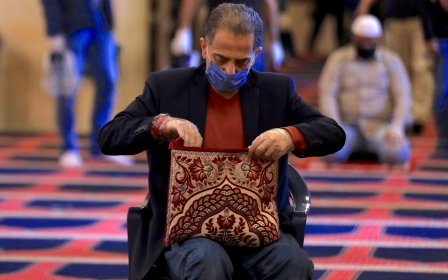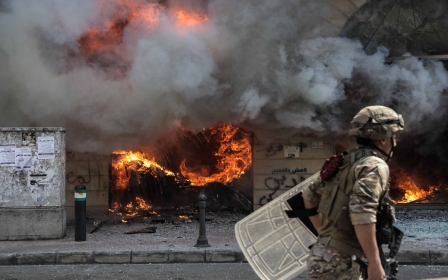Lebanon to enter full four-day lockdown as coronavirus cases surge
Lebanon will go under a four-day countrywide lockdown, the government announced on Tuesday, following a surge in coronavirus cases over the past week.
The decision was made during a four-hour cabinet meeting with the country's president, Michel Aoun. The lockdown will go into force from 7pm on Wednesday evening until 5am on Monday morning.
Lebanon’s interior ministry is set to release a statement on travelling curbs and other restrictions that the lockdown will entail. However, information minister Manal Abdel-Samad said that all businesses, with the exception of those in the medical, industrial, and agricultural sectors, will be closed.
Prior to the meeting, Prime Minister Hassan Diab said “unfortunately due to idleness in some areas and irresponsibility of some, this achievement is at risk of collapsing,” in reference to Lebanon’s ability to keep the number of infections relatively low.
Michel Aoun was far more blunt going into the meeting, saying that the measures need “revisioning” and “tightening” to prevent a continued surge in Covid-19 cases.
New MEE newsletter: Jerusalem Dispatch
Sign up to get the latest insights and analysis on Israel-Palestine, alongside Turkey Unpacked and other MEE newsletters
Lebanon entered a lockdown period in mid-March, often referred to as a “general mobilisation", but had started easing back measures last week.
The cash-strapped country, already suffering from a crippling economic crisis, came into the month of May optimistically, with record low cases since late April, and a five-stage phaseout plan to reopen businesses.
However, 120 new confirmed cases over the past six days has forced the government to reconsider its original plan. Lebanon has documented 870 cases, 26 which were fatal.
Health minister Hamad Hasan initially said on Saturday that he would propose a 48-hour lockdown because of the developments. Lebanon’s Ministry of Health had not responded to Middle East Eye when asked about new procedures that would be taken under lockdown.
“Some of these cases are from the repatriated [Lebanese expats], but more worryingly, some of those cases are local,” Firass Abiad, head of the government-run Rafic Hariri University Hospital, told MEE.
“The number of local cases have outnumbered those repatriated.”
Lebanon continues to repatriate stranded nationals in greater numbers, though two notable incidents over the past week have renewed concerns.
On 6 May, 25 returning Lebanese from Kano, Nigeria, were tested positive, while a video of a jam-packed flight of angry passengers returning from London dominated Lebanese social media feeds a few days later.
Among the expats who tested positive upon arrival, one failed to abide by the mandatory 14-day quarantine rule, later infecting others who visited him.
“We cannot stop it [repatriation] because it is not fair to tell the Lebanese abroad that they cannot come back, but we cannot do it at the pace that was already set,” Abiad said.
“The third wave of returns is supposed to bring back a large number – between seven and 10,000 – that is a huge number.”
Lebanese officials are currently meeting to discuss potential modifications to their repatriation plans.
Meanwhile, a soldier from the Lebanese army who contracted the virus infected at least 13 others at the military court.
Abiad, among other health experts in Lebanon, has warned the country for weeks of a potential second wave of Covid-19 – and Lebanon may have to shoulder a great burden, as the new cases are distributed among several governorates and that Lebanon’s public health services remain underfunded.
“Lebanon has not invested heavily in its public health [services],” Abiad said. “And now this is coming back to bite us.”
Middle East Eye delivers independent and unrivalled coverage and analysis of the Middle East, North Africa and beyond. To learn more about republishing this content and the associated fees, please fill out this form. More about MEE can be found here.




